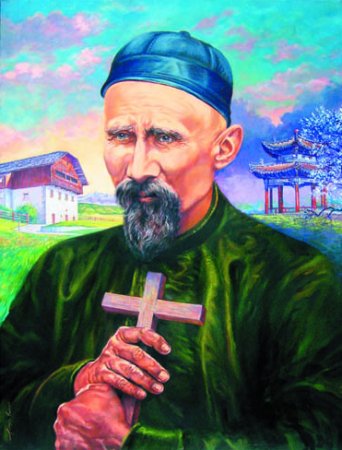NAGHIHINTAY ANG DIYOS SA IYONG PAGBABALIK
Tayo ay naniniwala na sa mga Sakramento ay makakasama o mararanasan nating ang Dios. Halimbawa sa Banal na Misa, tinatanggap natin si Kristo bilang Salita sa ating pakikinig sa mga pagbasa at sermon, at sa anyo ng tinapay at alak sa Banal na Komunyon. Kaya nga marami ang nagsisimba para makasama at tanggapin and Dios sa kanilang buhay.
Maliban sa Misa, ang sakramento ng Binyag, Kumpil, at Ordinasyon ay mga sakramentong maraming tao ang dumadalo sapagkat pinaniniwalaan natin na ang mga okasyong ito ay hindi lamang masaya kundi puno din ng biyaya ng Dios kung saan mararanasan ang kadakilaan at pag-ibig ng Dios.
Subalit mapapansin natin na sa Sakramento ng Kumpisal, madalang pa sa patak ng ulan ang mga tumatangkilik nito. Ilan sa mga sinasabing dahilan bakit iilan lang ang nangungumpisal ay dahil natatakot ang marami na PAGALITAN NG PARI. Sinu naman ang hindi matatakot sa pari kung simula pagkabata ay sinasabi sayo… “Pssst.. Huwag kang malikot sa simbahan. Papagalitan ka ni Pader…” Kaya ganun na lamang ang takot ng marami na lumapit sa pari sa kumpisalan. Lalong-lalo na ang sabihin ang kanyang mga kasalanan. Para sa kanya ang Dios ay makapangyarihan at malupit sa kanyang pagpaparusa na kailangang iwasan at layuan.
Sa Ebanghelyo natin ngayon, kabaligtaran ang sinasabi ni Hesus. Sa pamamagitan ng dalawang kwento, ang “Nawawalang Tupa” at “Nawawalang Pilak” ipinapakita ni Hesus ang pagsisikap ng Dios na hanapin ang mga naliligaw ng landas at ang laki ng kagalakan ng Dios pag ito ay nagbalik sa kanya.
Sa kwento ng ng “Nawawalang Tupa” masasabi nating napakairresponsable naman ng pastol para iwanan ang 99 para lang sa iisang nawawala. Pwedi namang hayaan na lang niya iyon. Mas higit na mahalaga ang naiwang 99.
Subalit ang binibigyang diin ng kwento ay hindi kung sinu ang mas mahalaga kundi gaano kahalaga ang bawat isang tupa, o tao sa Mabuting Pastol, sa Dios. Sa pamamagitan ng kwento, sinasabi niya sa atin na di niya hahayaang may mawala kahit isa. Gagawin ng Dios ang lahat makita at maibalik lang ito sa kanyang piling. Mahalaga ang bawat isa sa Dios… Maging sinu ka man. Kaya walang dahilan para matakot at iwasan natin ang Dios.
Sa kwento ng “Nawawalang Pilak” ay lumalabas na OA (over acting) ang babae. Gaanu ba kahalaga ang isang pilak para guluhin niya ang kanyang buhay at bahay? Ayun sa mga eksperto sa bibliya ay maaring aras na ginamit sa kanyang kasal ang nasabing o di naman kaya ay katumbas ng isang araw ng sahud ng isang manggagawa. Kaya naman pala ganun na lang ang pagsisikap ng babae na makita ang nawawalang pilak. Ginawa niya ang lahat makita lamang ang pilak.
Para kay Hesus, ang Dios ay katulad ng babae sa kanyang pagsisikap na maibalik sa kanyang piling ang mga nawawala, ang mga naliligaw ng landas. Dahil sa kanyang dakilang pag-ibig, gagawin niya ang lahat para sa atin… (mag mukha man itong OA). Kaya nga ang kanyang kaisa-isa at pinakamamahal na anak ay kanyang sinugo para para sa ating kaligtasan. Napakatindi ng paghahangad ng Dios na ang tao ay bumalik sa kanya. Kaya walang dahilan para layuan at katakotan ang Dios, na tangihan ang kanyang paanyaya na magbalik-loob sa kanya.
At matapos makita at maibalik ang nawawala, katulad sa kwento, magsasaya ang Dios. Ipamamalita niya ito at magaanyaya ng makikipagsaya sa kanya. Napakadakila ng pag-ibig ng Diyos. Paulit-ulit man Siyang sinusuway, nandiyan pa rin siya at naghihintay, at handang magpatawad. Di natin mararanasan ang kanyang pagpapatawad at pag-ibig kundi di rin tayo tutugon sa kanyang paanyaya. Kaya’t iwaksi (alisin na) ang takot sa puso’t sa halip ay tanggapin ang Dios sa ating buhay. Ito lamang ang tanging paraan katulad ng pagmamahal sa kwentong ito:
Newspaper columnist and minister George Crane tells of a wife who came into his office full of hatred toward her husband. "I do not only want to get rid of him, I want to get even. Before I divorce him, I want to hurt him as much as he has me."
Dr. Crane suggested an ingenious plan "Go home and act as if you really love your husband. Tell him how much he means to you. Praise him for every decent trait. Go out of your way to be as kind, considerate, and generous as possible. Spare no efforts to please him, to enjoy him. Make him believe you love him. After you've convinced him of your undying love and that you cannot live without him, then drop the bomb. Tell him that your're getting a divorce. That will really hurt him." With revenge in her eyes, she smiled and exclaimed, "Beautiful, beautiful. Will he ever be surprised!" And she did it with enthusiasm. Acting "as if." For two months she showed love, kindness, listening, giving, reinforcing, sharing. When she didn't return, Crane called. "Are you ready now to go through with the divorce?"
"Divorce?" she exclaimed. "Never! I discovered I really do love him." Her actions had changed her feelings. Motion resulted in emotion. The ability to love is established not so much by fervent promise as often repeated deeds. J. Allan Petersen.
Ganun din ang lumapit at ibigin ang Diyos, di natin mararamdaman ang kanyang pagpapatawad, awa at biyaya kung hindi natin ilalapit ang ating sarili sa kanya.




